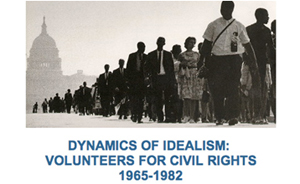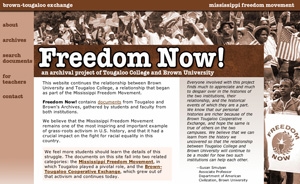talking history | syllabi | students | teachers | puzzle | about us
Dynamics of Idealism: Volunteers for Civil Rights, 1965–1982,
http://www.disc.wisc.edu/Idealism/index.html
Created and maintained by the Data and Information Services Center, University of Wisconsin-Madison.
Reviewed June 2009.
Freedom Now! An Archival Project of Tougaloo College and Brown University
http://www.stg.brown.edu/projects/FreedomNow/
Created and maintained by the Scholarly Technology Group, Brown University.
Reviewed June-July 2009.
In 1965 the sociologists Michael T. Aiken, N. J. Demereth, and Gerald Marwell administered surveys to volunteers who were headed to Mississippi to help organize and register African Americans to vote. Before taking part in the Southern Christian Leadership Conference’s Summer Community Organizing and Political Education (SCOPE) project, volunteers filled out questionnaires to document their attitudes about race, politics and activism, commitment to social change, interracial experiences, and career aspirations. Two months later, they completed another questionnaire to detail what they had learned about themselves. Approximately 255 volunteers returned completed surveys. Seventeen years later, over 100 SCOPE participants responded to a survey that gauged the effects of their experience in Mississippi, including their levels of political participation, attitudes toward civil rights and social movements, and other political, economic, and religious issues. The data collected from this long study is now available online at the Dynamics of Idealism Web site.

While Dynamics of Idealism is informative and fairly easy to navigate, it is immediately apparent that the data stored on the site is not meant for casual perusal or classroom use; the Web site is only a repository for the raw material. The site actually warns users against downloading the data unless they have a working knowledge of statistical analysis programs such as SPSS or SAS. I ignored the warning and clicked through to the results of the questionnaires and found myself staring at a string of numbers that looked like obscure programming language. To make sense of the data, I had to use a downloadable codebook to translate the numbers by hand. The site warned that this “can be a tedious and difficult process,” and it proved to be a little too tedious and difficult for me.
I was disappointed that the site did not offer a sample analysis or images of the questionnaires so that I could glimpse the thoughts and experiences of those idealistic and courageous volunteers who risked their lives to expand suffrage. Such information could assist scholars of the civil rights movement and would benefit high school and college instructors who teach about disfranchisement and voter registration campaigns. Since the primary researchers published a book and numerous articles about their findings, the site could provide a link to their results so that statistically challenged users (such as myself) could still benefit from their interesting and important work. Despite the difficulties I had, someone more skilled at analyzing data will find Dynamics of Idealism very useful. At the very least, it is important to have the data digitized and available to scholars everywhere.

Like the Dynamics of Idealism site, Freedom Now! explores the relationship between northern do-gooders and Mississippi civil rights activists. The site documents the Tougaloo College-Brown University Cooperative Exchange, a student/faculty exchange program that was established during the heady days of the 1964 Freedom Summer and maintained for over forty years. An exciting archival resource, Freedom Now! is the latest cooperative initiative of the sister schools. In 2002 six students from both schools joined faculty and staff for a ten-week project to collect and digitize the most “visually stimulating” and representative archival documents that told the story of the Tougaloo/Mississippi Freedom movement and the Tougaloo-Brown Exchange so that scholars and students could benefit from their findings. What they created is a user-friendly site, full of interesting, surprising, and thoughtful documents, lesson plans, and cluster essays that high school and college teachers and students will appreciate.
There are many rich layers to the site and it is worth the time to explore it thoroughly. A good place to start would be the cluster essays written by Brown and Tougaloo students involved in the project. All of the essays provide a thoughtful backdrop to the archival findings and are presented in a clear, concise, interesting, and informative manner. Scattered around each essay are primary sources, which users can click on to illustrate and expand the themes discussed. Besides letters, poll-tax receipts, White Citizens‘ Council propaganda, photographs, and speeches, there are some incredible materials attached to these short articles. For example, in the essay on voter registration by Tiffany Joseph and Gabriel Mendes, there is a Quicktime video of Unita Blackwell—a sharecropper, Student Nonviolent Coordinating Committee (SNCC) activist, and the first African American woman to be mayor of a Mississippi town. In the brief 2002 interview, Blackwell talks about the special vulnerability of black women activists and the sexual harassment they faced during the civil rights movement. She described one encounter that was quite common, but almost never discussed by historians of the freedom struggle: “One time I was coming back from Yazoo City and met the white police,” she said. “I had on pants and he made me take them off and stand there. And [he] asked the other man, ’You want some of this?‘ And the other one said, ’Nah.‘” She stared at the interviewer. “Ain’t that somethin’?” she asked.
In addition to the essays, there are two thoughtful lesson plans that could easily be adapted for a high school classroom or an undergraduate survey. One lesson plan asks students to evaluate letters from college students about their experiences in Mississippi and another asks students to fill out a Mississippi voter registration application and analyze poll-tax receipts, affidavits from African Americans denied the right to vote, and posters to help mobilize voting campaigns.
Finally, there is an effortless search feature (using keyword or a drop-down menu) that allows users to explore about 200 documents collected on the site, including materials related to SNCC, the Delta Ministry, the Republic of New Africa, the Meredith March against Fear, Fannie Lou Hamer, Aaron Henry, Freedom Summer, the Child Development Group of Mississippi, racial health disparities, the White Citizens Council, and the State Sovereignty Commission.
Overall, Freedom Now! is a revealing and rewarding site that will find a wide audience.
Danielle McGuire
Wayne State University
Detroit, Michigan
